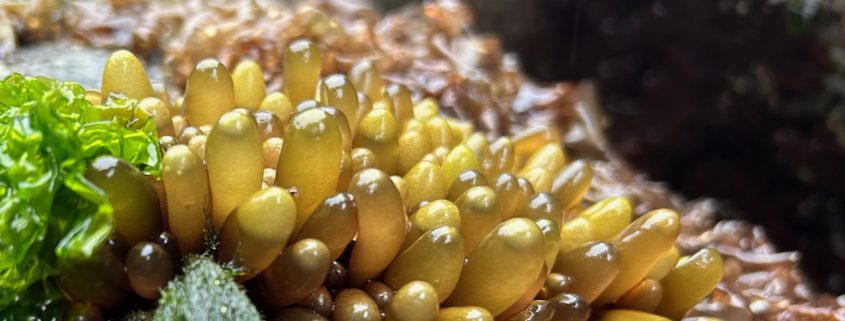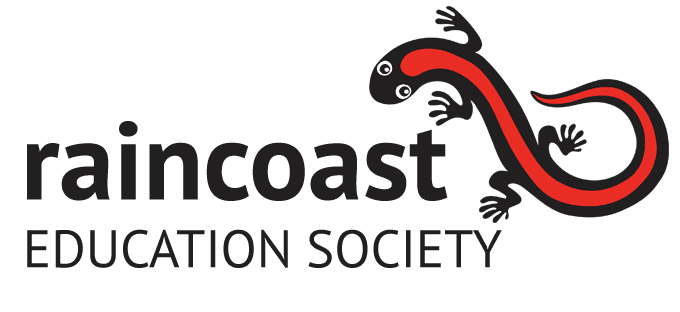
This weekend field course, based out of the Ucluelet Community Centre, will introduce participants to the world of west coast seaweeds. Topics to be covered in this year’s course include an introduction to seaweeds (What are they? What is their role in coastal ecology? How are they used in B.C. aquaculture? How are seaweeds impacted by climate change?) Learn of the biodiversity of west coast seaweeds, essentials of collecting and identifying seaweeds, seaweed foraging, the relationship between seaweeds and people, pressing and preserving seaweeds, cyanotype and more!
We are excited to welcome back course instructor Dr. Bridgette Clarkston and to introduce Dr. Jennifer Clark, coming to Ucluelet to share their seaweed knowledge and expertise with us.
Course registration is $330 per person.
Friday, June 7th (7:00 pm – 8:30 pm)
- Presentation – overview of west coast seaweeds, different seaweed groups, role of seaweeds in coastal marine ecosystems.
Saturday, June 8th (8:30 am -8:30 pm, with breaks) Low tide is at 8:44 am (0.6 feet / .2 m)
- Field trip to explore seaweeds on Ucluelet’s rocky coast and practice naturalist skills, including fundamentals of seaweed identification.
- Collection of seaweeds at field site.
- Workshop to practice using dichotomous keys, field guides and online databases to identify unknown specimens
- Create your own scientific and artistic seaweed presses.
- Cynaoptype, Seaweed as art: create your own beautiful botanical blueprint using the traditional method of cyanotype printing.
- Presentation – seaweeds and people: from traditional uses to modern foraging, and everything in between.
Sunday, June 9th (8:30 am – 1:00 pm) Low tide is at 9:27am (1. feet / .3 m)
- Putting it all together – field trip to identify seaweeds and their communities in nature, including opportunities to share what you’ve learned with the group.
- Course wrap-up.
About the instructor:

Dr. Bridgette Clarkston loves seaweeds and thinks you should too. Bridgette is an Associate Professor of Teaching at the University of British Columbia and co-author of the field guide Pacific Seaweeds: A Guide to Common Seaweeds of the West Coast (Harbour Publishing). A delightful moment in a lifetime spent appreciating BC’s seaweeds was discovering a new genus of beautiful red seaweeds and naming it after the Salish Sea (Salishia). A Vancouver Island settler, Bridgette was born and raised on the unceded traditional territory of the K’ómoks First Nation, the traditional keepers of this land. Learn more about Bridgette on the UBC Botany website here.
 Dr. Jennifer Clark grew up on the coast on the traditional lands of xʷməθkʷəy̓əm (Musqueam), Sḵwx̱wú7mesh (Squamish), and səlilwətaɬ (Tsleil-Waututh) Nations in BC and always knew that she would pursue a career studying the ocean, especially with the ocean as her backyard. She has 10+ years of research and cultivation experience of seaweeds in Canada and Australia where she focused on understanding climate change impacts on seaweeds. Although Jennifer received her PhD in Australia, the cold waters of the Pacific Northwest were calling and she returned to Canada to undertake a postdoctoral research position with the University of British Columbia, Hakai Institute in collaboration with the Heiltsuk and Wuikinuxv First Nations. During this time, she learned the importance of coastal foods to coastal communities and the nutritional and health benefits of seaweeds. In her current role as Chief Scientist at Cascadia Seaweed, Jennifer leads the research and cultivation of kelp seed used to grow nutritious, regenerative kelp for use in agricultural products and restoration efforts. Jennifer is passionate about seaweeds due to their status as a renewable and nutritional food source, beneficial in their ability to buffer the effects of climate change and their vital role in maintaining healthy coastal ecosystems.
Dr. Jennifer Clark grew up on the coast on the traditional lands of xʷməθkʷəy̓əm (Musqueam), Sḵwx̱wú7mesh (Squamish), and səlilwətaɬ (Tsleil-Waututh) Nations in BC and always knew that she would pursue a career studying the ocean, especially with the ocean as her backyard. She has 10+ years of research and cultivation experience of seaweeds in Canada and Australia where she focused on understanding climate change impacts on seaweeds. Although Jennifer received her PhD in Australia, the cold waters of the Pacific Northwest were calling and she returned to Canada to undertake a postdoctoral research position with the University of British Columbia, Hakai Institute in collaboration with the Heiltsuk and Wuikinuxv First Nations. During this time, she learned the importance of coastal foods to coastal communities and the nutritional and health benefits of seaweeds. In her current role as Chief Scientist at Cascadia Seaweed, Jennifer leads the research and cultivation of kelp seed used to grow nutritious, regenerative kelp for use in agricultural products and restoration efforts. Jennifer is passionate about seaweeds due to their status as a renewable and nutritional food source, beneficial in their ability to buffer the effects of climate change and their vital role in maintaining healthy coastal ecosystems.
Check out photos of the previous years:

